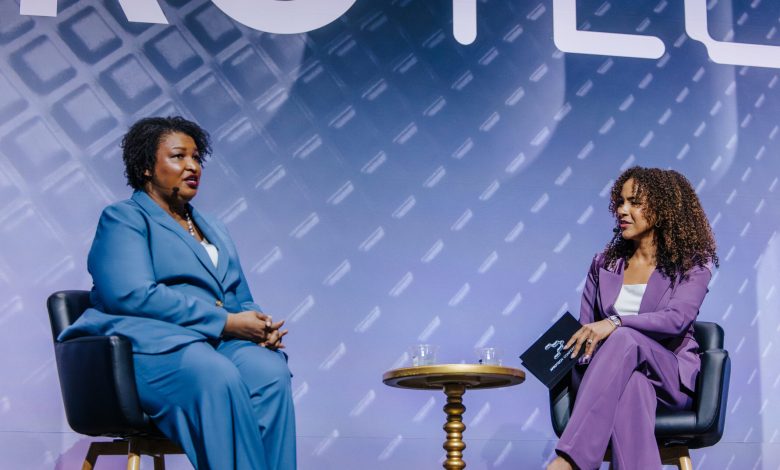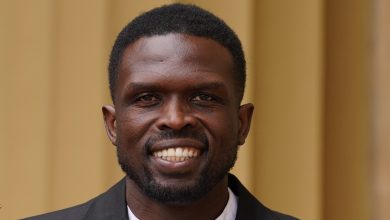Stacey Abrams’ Life In Mississippi Drives Her Commitment To Democracy In An AI-Driven World: ‘Often We’re Told To Pick A Lane…I Picked A Freeway’


Stacey Abrams wears many hats. The first Black woman nominated for governor in U.S. history, she is a national leader, voting rights advocate, romance and thriller novelist, and serial entrepreneur with her own media and podcast ventures.
At AFROTECH™ Conference 2025 in Houston, Abrams joined Dr. Rachel Gillum, vice president of ethical and humane use of technology at Salesforce, for a session titled “Democracy in the World of AI,” highlighting AI’s rapid spread, its impact on every sector from health care to the economy, and its connection to democracy.
Abrams explained that her commitment to democracy is driven by her experience with poverty, which she called immoral, economically inefficient, and solvable — a reality she is determined never to return to.
“Democracy is how we have always advanced the cause of more voices being involved in the answer,” Abrams shared from the stage. “I create companies because I was poor, and I don’t like it, and don’t ever want to do it again. My mother used to call us the genteel poor. We had no money, but we watched PBS, and we read books, and I’m very comfortable with not being poor. And so I want to give that to other people. But to get to that space, to build the democracy, we need to create the economic opportunities to create prosperity for our communities, for our people.”
Abrams emphasized the importance of tackling challenges from multiple angles. For her, the question is which approach will have the greatest impact in the moment — whether starting an organization to protect democracy, writing a book on the vulnerabilities of the power grid, or creating a children’s book about hunger.
“And so often we’re told to pick a lane. I did. I picked a freeway,” Abrams said. “And so for me, it’s how do I navigate in the moment? How do I pick which lane makes the most sense for the outcome?”
The latest novel she’s written, “Coded Justice,” released on July 15, 2025, blends AI, ethics, health care, veterans’ issues, and a touch of romance. Abrams said she wanted to explore the challenges of AI while also reflecting on diversity, equity, and inclusion (DEI), which she sees as central to America’s identity.
“We are in a moment where our very diversity of our pluralistic democracies [is] under attack, and the underpinning [of] the conversation about DEI [is] getting consumed by this false narrative of who should be hired,” she said. “It is how we have constructed a multiracial, multi-ethnic, multi-identity nation. And so those who are attacking DEI are attacking the nature of who we intend to be as a country.”
While AI offers tremendous opportunities to expand knowledge and access across languages, it also carries risks, especially when poorly designed or misunderstood — similar to the challenges of social media and information silos. Abrams shared how she applied multiple tools and deep research to write “Coded Justice,” modeling her approach to how people should engage with AI.
“Health care is a human right, and we can only achieve our intention of access if we use every tool at our disposal,” she said. “But if we use tools that we don’t understand, that we do not navigate, that we do not regulate, then what begins with good intention almost invariably goes wrong. And in a democracy, it is our responsibility to not simply adhere to the goals of the majority, but to understand the needs and the vulnerabilities of the minority.”
AI, Access, And The Road Ahead
To help communities gain the skills and influence needed in this new AI-forward era, Abrams highlighted Bean Path, an organization in Mississippi that she hopes to expand to Georgia. The program trains young people, seniors, and small business owners to use AI.
“That’s important because when we are afraid of knowledge, when we’re afraid of technology, we tend to isolate ourselves from it, which doesn’t mean it doesn’t exist; we simply lose control over it,” she said. “And our communities at this moment must understand what might supplant them.”
As concerns grow about AI’s impact on jobs and the future of work, Abrams stressed the importance of resilience, drawing inspiration from generations of extraordinary family members. Simply put, she said, she comes from a long line of people who refused to give up — and she is no different.
“Things aren’t right, things aren’t normal,” she said. “AI is coming after our jobs, but there are other facets that are coming after our lives, our resilience, our fortitude, our imagination, our existence, and they’re not shy about it. We cannot be shy about our responsibility to be just as loud, just as aggressive, just as engaged.”
As the session wrapped, Abrams challenged attendees to take action: Identify a person, organization, or problem where there may be unseen obstacles — and use the skills you have to make a difference.
“They are changing the nature of democracy, but democracy isn’t this esoteric idea,” Abrams said. “I don’t care about voting rights because I like casting a ballot, I care about voting rights because it’s power. And if we all decide we’re going to do something within our power to increase the power of someone else, to increase their access so that they know democracy can deliver, we cannot just save the nation, we can demand the nation we deserve. And that’s the work that gives me the most hope.”
Take this opportunity to join the conversation. Check out the full schedule for AFROTECH™ Conference and purchase your ticket now.




